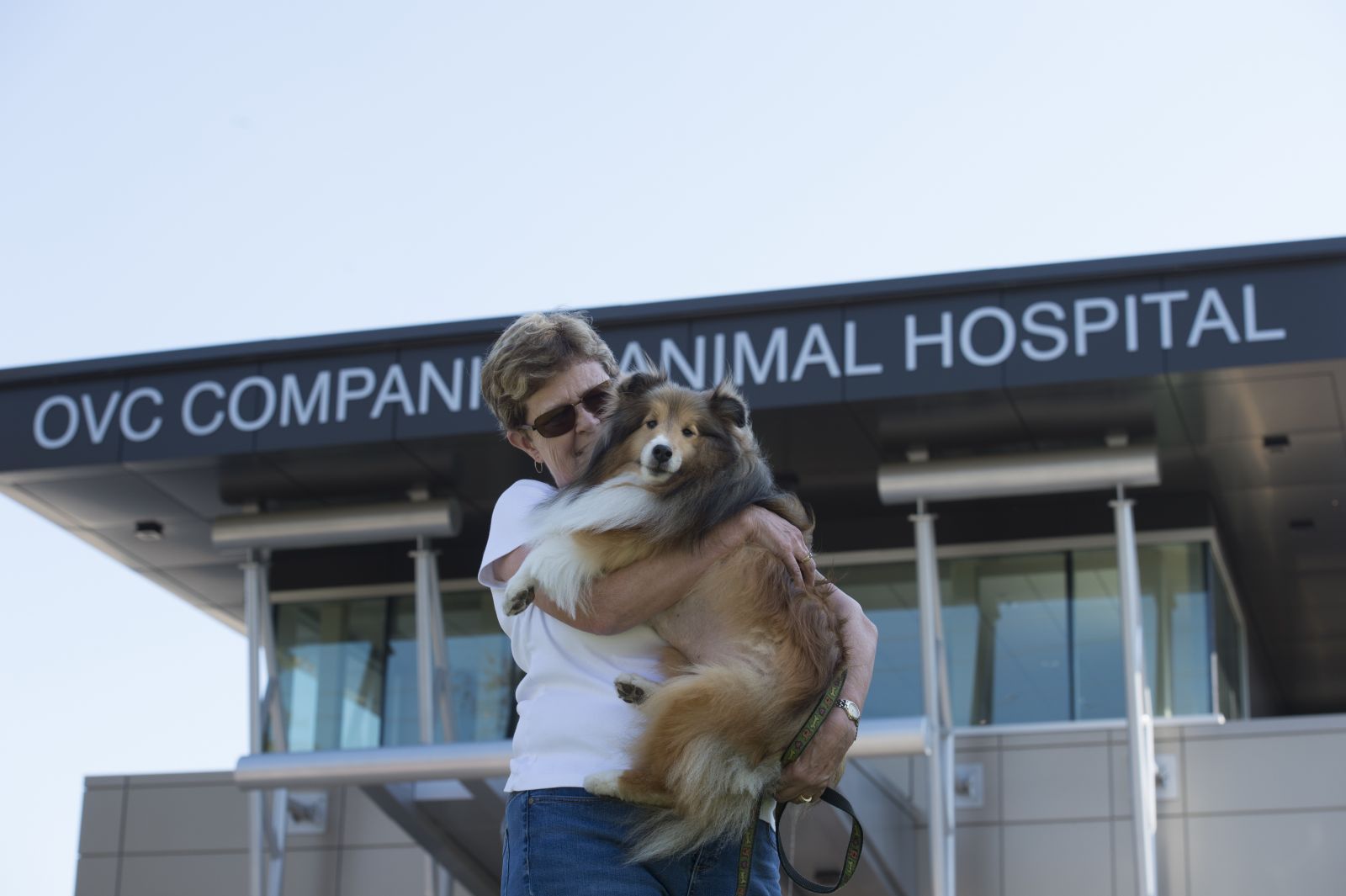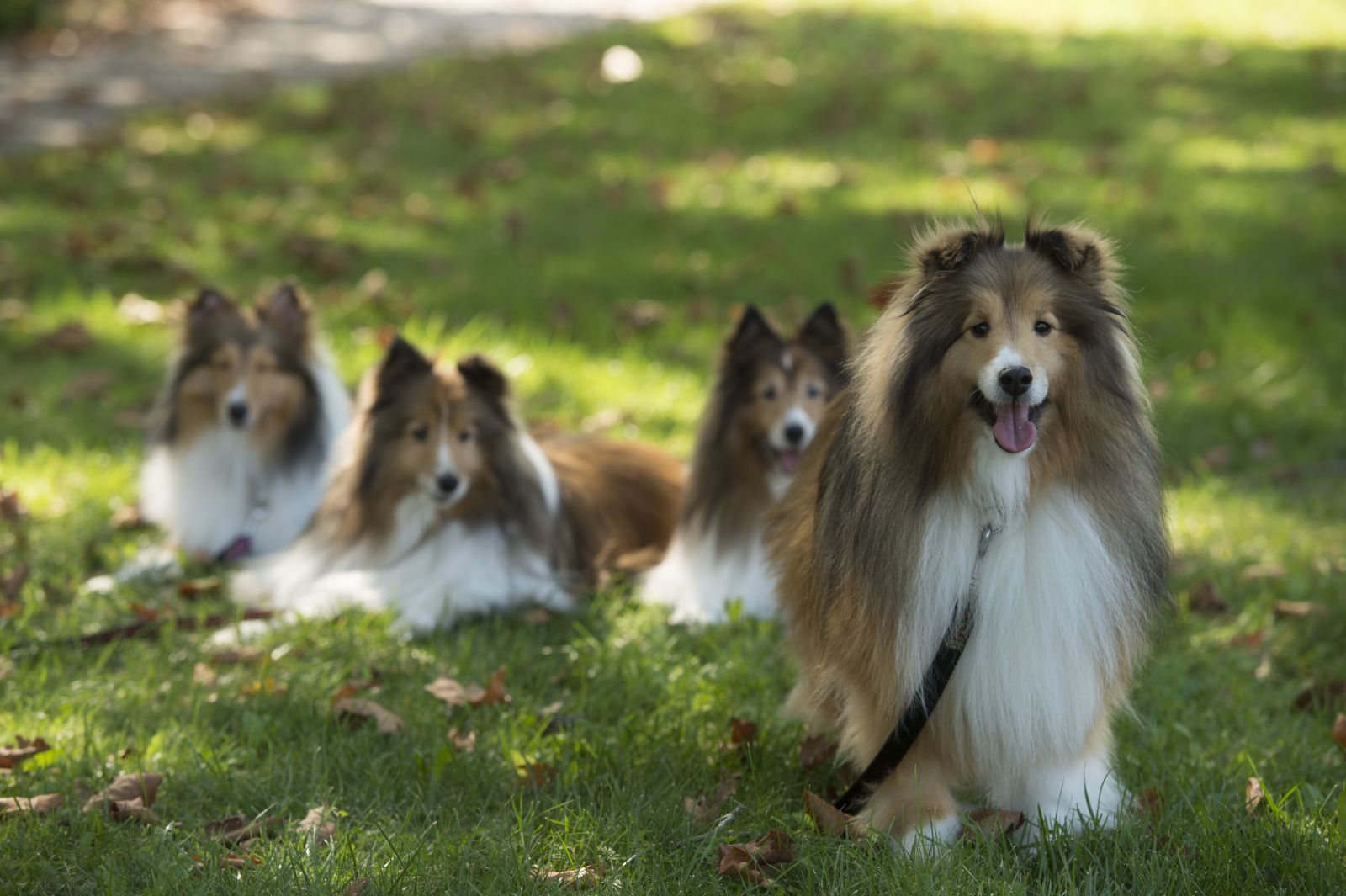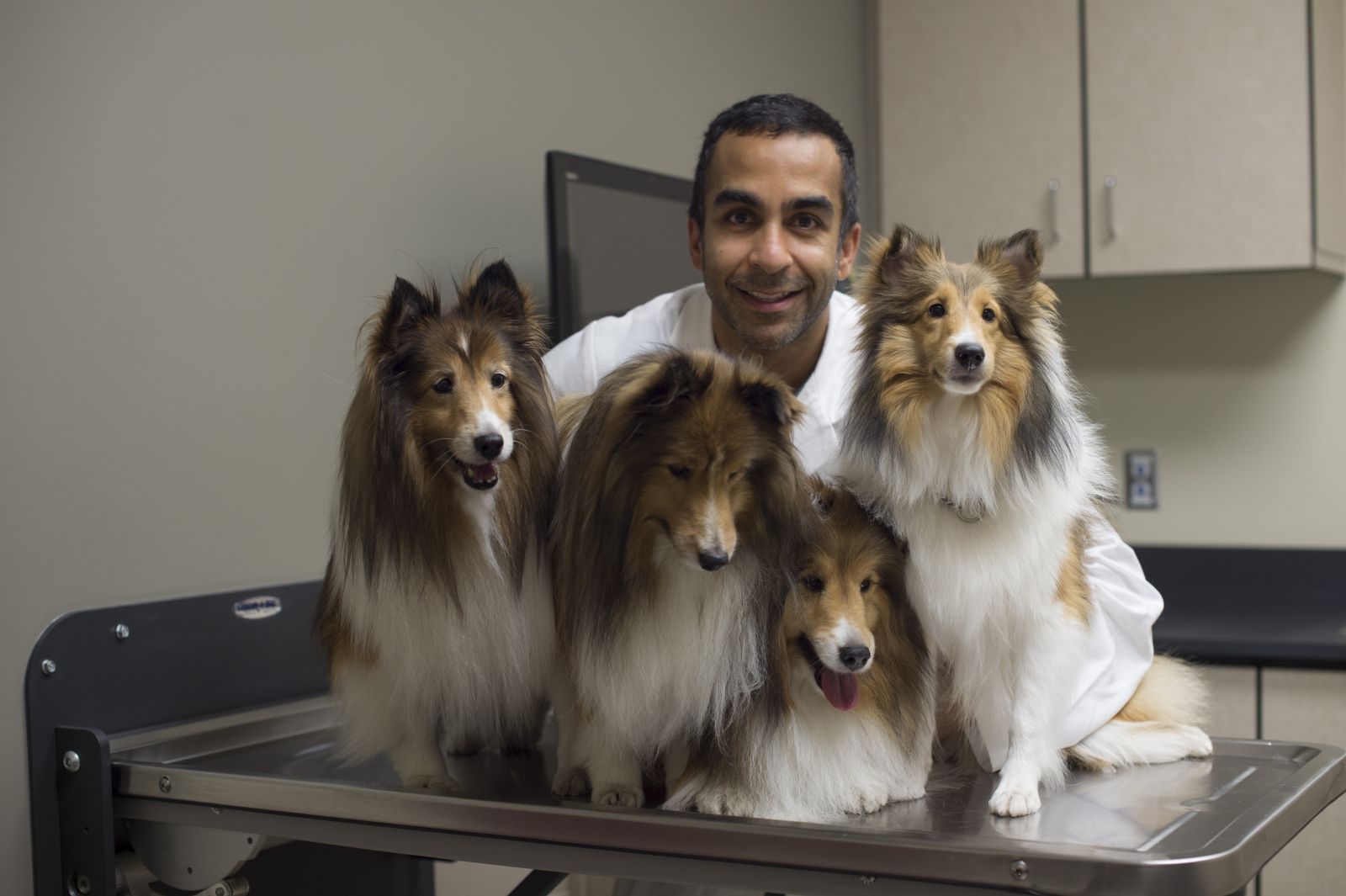Family shares their motivation for giving back to OVC Pet Trust this holiday season
Teresa Chadwick and Barbara Stephen share their home with four lively, sociable Shelties – Mazie, Max, Alfie and Annie. They’re also no strangers to the Ontario Veterinary College (OVC) at the University of Guelph – a place that holds a special place in their hearts, and has provided life-saving and advanced care to their dogs over the years.
“We know our Shelties wouldn’t be in the good health they are today if it wasn’t for the care they received at OVC,” Barbara says.
This fall, Teresa and Barbara shared their story with thousands of University of Guelph supporters through OVC Pet Trust’s annual fundraising campaign. They’re passionate about spreading the message of what supporting Pet Trust means not only for their own pets, but for the pets we all love.
.jpg)
Teresa and Barbara with their four Shelties at OVC this fall.
Teresa and Barbara’s first experience with OVC dates back to 1999, when their nine-year-old Collie named Fanny was admitted to OVC’s intensive care unit with a collapsed lung. Teresa and Barbara remember how amazing the team was in their care of Fanny, and have had nothing but positive memories of how compassionately they were treated during the difficult time.
In spring 2014, Alfie, who was two years old at the time, was diagnosed with rectal lymphoma following a colonoscopy and ultrasound. He was referred by his family veterinarian, Dr. Peter Terp at Renforth Animal Clinic in Etobicoke, to OVC. Alfie underwent six months of chemotherapy at the Mona Campbell Centre for Animal Cancer at OVC. Fortunately, he’s been in remission since September 2014, with ongoing check-ups every six weeks at OVC since.


Alfie underwent six months of chemotherapy after being diagnosed with lymphoma in 2014.
When Alfie was diagnosed with lymphoma, his owners learned he also had gallbladder mucocele. Teresa and Barbara had learned that a particular disease, termed gallbladder mucocele, is a common condition in Shelties – their first Sheltie, Casey, became ill with the condition and passed away in 2009. Gallbladder mucocele is caused by the over production of mucous in the gallbladder and results in the obstruction of bile, which is critical for many normal physiological processes. In some cases, the condition is so severe that surgery is required to remove the gallbladder and if not caught in its early stages, the outcome can be variable. In Teresa and Barbara’s case, three of their four dogs have now had their gallbladders removed over the last three years due to this serious condition.
In 2015, Mazie and Max both had their gallbladders removed at OVC using laparoscopic surgery, which is a form of minimally invasive surgery (MIS) in the abdomen. “Mazie and Max both had fast and full recoveries, and we’re so grateful to Dr. Ameet Singh who performed both of their surgeries.”
Laparoscopy is a MIS procedure that is performed with the use of a camera device called an endoscope and specialized instruments placed through multiple small incisions instead of one large opening in the abdomen. Since incisions are typically very small (usually a few millimeters in most cases), patients tend to have less pain and faster recovery time following surgery.
“Minimally invasive surgery provides multiple benefits to companion animals when addressing complex health issues,” says Dr. Ameet Singh, Associate Professor of Small Animal Surgery at the Ontario Veterinary College, University of Guelph. “When the laparoscopic method is deemed an appropriate technique for gallbladder mucocele, dogs experience a much shorter hospital stay, reduced post-operative pain and lower risk of complications related to the surgical incision.”
.jpg)
Dr. Ameet Singh and nine-month-old Annie at OVC Companion Animal Hospital.
In July 2016, Alfie was seen on an emergency basis at OVC as he had become quite ill and there was a concern his previously stable gallbladder mucocele was worsening. His condition had begun to deteriorate and Alfie required surgery to remove his gallbladder – similar to Mazie and Max. “Although Dr. Singh began the procedure laparoscopically, Alfie’s gallbladder was severely diseased and the transition to an open, traditional abdominal surgery was necessary to ensure safe removal of the gallbladder,” Barbara remembers. “Alfie required more time in hospital than the other two dogs. He took longer to heal, but he eventually bounced back to his sweet self.”
For many pet owners, the diagnosis of cancer or a serious medical condition requiring surgical intervention can be life-changing. Barbara and Teresa are grateful they were referred to OVC for all of the advanced care their dogs have received, and while the period of uncertainty during Alfie’s battle with lymphoma was challenging, they now try to pay-it-forward and help others who may be going through a similar journey.
“The waiting room at the cancer centre is a special place for us,” Teresa reflects. “After Alfie was diagnosed with lymphoma, we spent a lot of time at OVC – we were basket cases. Over a period of weeks and months, you see the same people come in and out with their pets. At the beginning, other people helped us; they helped us become more positive by telling us what they’d been through with their pet; they helped us realize there was hope. We’ve tried to now pay it forward and do the same for others as was done for us.”
Teresa and Barbara say they feel nothing but respect and admiration for everyone who works at OVC. “To us, OVC is family. A recognizable, friendly face means everything when you have a sick pet.”
Not only have staff at OVC made a difference in Barbara and Teresa’s lives, but they also treasure how reassuring and calming the staff make their dogs feel. “When Alfie arrives at OVC for check-ups, sometimes he’s a bit stressed. When he sees his favourite people, we see him relax almost immediately.”

Dr. Ameet Singh with the furry foursome at OVC: Mazie, Max, Alfie and Annie.
Barbara and Teresa recognize OVC is a leader in veterinary science and medicine. They feel that by supporting the work done here, both through sharing their story and donating financially, they can make a difference.
“It means absolutely everything to us that OVC is at the forefront of veterinary medicine,” Teresa says. “Not only has OVC given us more time with our own pets, they’re also training our future veterinarians who will go out into the world and treat all of our companion animals.”
The sense of community Barbara and Teresa established at OVC allowed them to discover the annual Smiling Blue Skies Walk for Canine Cancer in Toronto. The Smiling Blue Skies Cancer Fund has raised more than $1.6 million for OVC Pet Trust since 2001 and funds research and initiatives at OVC to advance the prevention and treatment of cancer and create leading edge facilities to treat cancer in pets.
When asked why they attend the Toronto walk each year, the answer is simple: “The reason is sitting here in our laps – our four dogs. Getting involved, spreading awareness and giving back is the least we can do,” Barbara says.
“As a pet owner, we support the work happening at OVC by giving to Pet Trust because of the gratitude we have for the team that saved our ‘furry kids’. We could not be more thankful.”
.jpg)
P.S. There are many ways to support OVC Pet Trust. Learn more about ways to get involved and help the pets we love – live longer, healthier lives.

